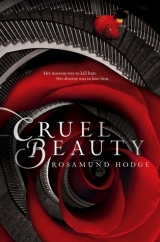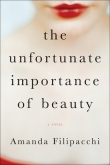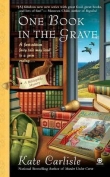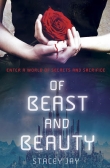
Текст книги "Cruel Beauty"
Автор книги: Rosamund Hodge
сообщить о нарушении
Текущая страница: 2 (всего у книги 17 страниц)
“It’s beautiful,” I murmured.
Ivy blushed as they dressed me, and the dress was worth blushing over: deep crimson like any other wedding dress, but far too gaudy and enticing. The skirt was a mass of ruffles and rosettes; the puffy sleeves left my shoulders bare, while the tight black bodice propped up my breasts and exposed them. There was no corset or shift underneath; they were dressing me so I could be stripped as quickly as possible.
Elspeth snickered as she buttoned up the front. “No use making a new husband wait, eh?”
I looked blankly at Aunt Telomache and she raised her eyebrows, as if to say, What did you expect?
“I’m sure he’ll fall in love with you at first sight,” said Ivy bravely. Her hands were shaking as she adjusted my skirt, so I managed to scrape up a smile for her. It seemed to calm her a little.
For the next few minutes, we all pretended that I was happy to marry. Elspeth and Ivy giggled and whispered; Astraia clapped her hands and hummed snatches of love songs; Aunt Telomache nodded, lips pursed in satisfaction. I stood quiet and compliant as a doll. If I stared very hard at the wall and reviewed the Hermetic sigils in my head, the bustle around me faded. I still noticed everything they did, but I didn’t have to feel much about it.
They combed my hair and pinned it up, hung rubies in my ears and around my neck, painted rouge on my lips and cheeks, and anointed my wrists and throat with musk. Finally they hustled me in front of the mirror.
A gleaming, crimson-clad lady stared back at me. Until this day, I had worn only the plain black of mourning, even though Father had told us when we were twelve that we could dress as we pleased. Everybody thought that I did it because I was such a pious daughter, but I simply hated pretending that everything was all right.
“You look like a dream.” Astraia slid her arm around my waist, smiling tremulously at our reflections.
Everybody said that Astraia was the very image of our mother, and certainly she could not have gotten her looks anywhere else: the plump, dimpled cheeks, the pouting lips, the snub nose and dark curls. But I might have been born straight out of my father’s head like Athena: I had his high cheekbones, his aristocratic nose, his straight black hair. In a rare burst of kindness, Aunt Telomache had once told me that while Astraia was “pretty,” I was “regal”; but everyone who saw Astraia smiled at her, while people only nodded at me and said my father must be proud.
Proud, yes. But not loving. Even when we were very young, it was clear that Astraia took after Mother, and I after Father. So there was never any question which one of us would pay for his sin.
Aunt Telomache clapped her hands. “That’s enough, girls,” she said. “Say good-bye and run along.”
Elspeth looked me up and down. “You look pretty enough to eat, miss. May the gods smile on your marriage.” She shrugged, as if to say it was no concern of hers, and left.
Ivy hugged me and slipped a little straw man into my hand. “It’s Brigit’s son, young Tom-a-Lone,” she whispered. “For luck.” She whirled away after Elspeth.
I crushed the charm in my hand. Tom-a-Lone was a hedge-god, the peasants’ lord of death and love. The village folk might sacrifice to Zeus or Hera sometimes, when custom demanded it, but for sick children, uncertain crops, and unrequited love, they prayed to the hedge-gods, the deities they had worshipped long before Romana-Graecian ships ever landed on their shores. Scholars agreed that the hedge-gods were merely superstition, or else garbled versions of the celestial gods—that Tom-a-Lone was but another form of Adonis, Brigit another name for Aphrodite—and that either way, the only rational course was to worship the gods under their true names.
Certainly the hedge-gods hadn’t saved Elspeth’s brother from the demons. But the gods of Olympus hardly seemed inclined to rescue me, either.
With a sigh, Aunt Telomache unfolded my fist and plucked out the crumpled Tom-a-Lone.
“Still they cling to their superstitions,” she muttered, and flung it into the fireplace. “You would think Romana-Graecia conquered them last week and not twelve hundred years ago.”
And from the way Aunt Telomache talked, you would think she was descended in a straight line from Prince Claudius, when in fact she and Mother came from a family that was only three generations removed from being peasants. But there was no use pointing that out to her.
“You don’t know,” Astraia protested. “It might bring good luck, after all.”
“And then the Kindly Ones will grant her three wishes, I suppose?” said Aunt Telomache, sounding more indulgent than annoyed. Then she turned a stony gaze on me. “I trust I don’t need to remind you how important this day is. But it is easy for the young to forget such things.”
No, it’s easy for you, I thought. Tonight you will fondle my father while I am the plaything of a demon.
“Yes, Aunt.” I looked down at my hands.
She sighed, eyelids drooping in preparation for another tender moment. “If only dear Thisbe—”
“Aunt,” said Astraia, who was now standing beside the chest of drawers. “Aren’t you forgetting something?” Her hands were behind her back, her smile as big and bright as the time she had eaten all the blackberry tarts.
“No, child—”
“So isn’t it lucky I remembered?” With a flourish, she pulled out from behind her back a slim steel knife hanging in a black leather harness.
For an instant, Aunt Telomache stared at the knife as if it were a big, fat spider. I felt as if I had swallowed that spider, as if it were crawling down my gullet with poisonous legs. That was how lying felt: all the lies I had swallowed and spat out again, vile and empty as the husks of dead insects, all for the sake of making sure that precious Astraia could stay happy. And this knife was the most important lie in our family.
“I had it specially made,” Astraia went on earnestly. “It’s never cut a living thing. Just to be safe, it’s never been used at all, not even tested. Olmer swore it wasn’t, and you know he never lies.”
Unlike the rest of us, who had been telling her for the last four years that there was a chance I could kill the Gentle Lord and walk away.
“You do realize,” Aunt Telomache said gently, “that it’s possible Nyx won’t get a chance to use the knife? And”—she paused delicately—”we can’t be sure it will work.”
Astraia raised her chin. “The Rhyme is true, I know it. And even if it isn’t, why shouldn’t Nyx try? I don’t see how stabbing the Gentle Lord could possibly hurt.”
It would show him that I was not broken and cowed, that I had come as a saboteur to destroy him. It would likely make him kill or imprison me, and then I would never have a chance to carry out Father’s actual plan. Even if the Rhyme were true—even if—trying to fulfill it was still a bad bet, when the Resurgandi might never have another chance like me again.
“I don’t know why you’re so reluctant to trust Nyx,” Astraia added in an undertone. “Isn’t she your dearest sister’s daughter?”
Of course she didn’t understand. She’d never had to think through this plan, weighing every risk because she had only one life to lose. She’d never woken up in the night, choking on a dream of a shadow-husband who tore her to pieces, and thought, It doesn’t matter how he hurts me. I’m the only chance to save us from the demons.
Aunt Telomache met my eyes, and the flat set of her mouth spoke as clearly as words: Indulge her for now, but you know what to do.
Then she pulled Astraia close and dropped a kiss on her forehead. “Oh, child, you’re an example to us all.”
Astraia wriggled happily—she was almost a cat, she liked so much to be petted—then pulled free and gave me the knife, smiling as if the Gentle Lord were already defeated. As if nothing were wrong. And for her nothing ever would be wrong. Just for me.
“Thank you,” I murmured. I could feel the rage pushing at me like a swell of cold water, and I didn’t dare meet her eyes as I took the knife and harness. I tried to remember the panic that burned through me last night, when I thought her heart was broken.
She was comforted in minutes. Do you think she’ll mourn you any longer after your wedding?
“Here, I’ll help!” She dropped to her knees and strapped the knife to my thigh. “I’m sure you can do it. I know you can. Maybe you’ll be back by teatime!” She beamed up at me.
I had to smile back. It felt like I was baring my teeth, but she didn’t seem to notice. Of course not. For eight years I’d borne this fate, and in all that time she’d never noticed how terrified I was.
For eight years you lied to her with every breath, and now you hate her because she’s deceived?
“I’ll give you a moment to yourselves,” said Aunt Telomache. “The procession is ready. Don’t dawdle.”
The door clicked shut behind her, and in the silence that followed, from outside I heard the faint patter of drums and wail of flutes: the wedding procession.
Astraia’s mouth trembled, but she pushed it up into a smile. “It seems so recently we were children dreaming of our weddings.”
“Yes,” I said. I had never dreamt of weddings. Father told me my destiny when I was nine.
“And we read that book, the one with all the fairy tales, and argued about which prince was best.”
“Yes,” I whispered. That much was true, anyway. I wondered if my face still looked kind.
“And then not too long after Father told us about you”—well, he told her, when she turned thirteen and wouldn’t stop trying to matchmake me—“and I cried for days but then Aunt Telomache told us about the Sibyl’s Rhyme.”
Every half-educated child knew about the Sibyl’s Rhyme. In the ancient days, Apollo would sometimes touch a woman with his power, granting her wisdom and driving her mad at once, and she would live in his sacred grotto and prophesy on his behalf. They said that on the day of the Sundering, the sibyl stood up and proclaimed a single verse, then threw herself into the holy fire and died; she was the last sibyl, and that day was the last time the gods ever spoke to us.
Every well-educated child knew that it was just a legend. There was no good evidence that there had been a sibyl in Arcadia at the time of the Sundering, let alone that she had said such a thing, and no ancient lore about demons, nor any newly discovered Hermetic principle, so much as hinted that what the Rhyme prescribed could work.
The day that Aunt Telomache told Astraia the Rhyme, she forbade me ever to tell her that it wasn’t true. “The poor child’s had enough of tears,” she’d said. “As you love her, let her believe it.”
I had promised and I had kept my promise, and so now I got to watch Astraia clasp her hands and recite it in a low, reverent voice:
“A virgin knife in a virgin’s hand
Can kill the beast that rules the land.
”
A hopeful half smile twisted at her lips, and she darted hopeful half glances at my face. It was my cue to smile and pretend to be comforted, as if the Rhyme were true. As if Astraia weren’t asking for comfort as much as trying to give it. As if I had ever lived in her world, where daughters were loved and protected, and the gods offered an escape from every terrible fate.
You wanted her to think that, I told myself, but all I wanted right now was to seize a book off the table and throw it at her face. Instead I clenched my hands and said sourly, “We both know the Rhyme. What’s your point?”
Astraia wilted a moment, then rallied. “I just wanted to say . . . I believe you can do it. I believe you will cut off his head and come home to us.”
Then she flung her arms around me. My shoulders tightened and I almost jerked away, but instead I made myself embrace her back. She was my only sister. I should love her and be willing to die for her, since the only other choice was that she die for me. And I did love her; I just couldn’t stop resenting her either.
“I know Mother would be proud of you,” she muttered. Her shoulders quivered under my arms and I realized she was crying.
She dared to cry? On this day of all days? I was the one who would be married by sunset, and I hadn’t let myself cry in five years.
There was ice in my lungs and I couldn’t breathe. I was floating, I was swept away, and out of the cold I spoke to her in a voice as soft as snow, the gentle and obedient voice that I had used to consent to every order that Father and Aunt Telomache ever gave me, every order that they would never give Astraia because they actually loved her.
“You know, that Rhyme is a lie that Aunt Telomache only told you because you weren’t strong enough to bear the truth.”
I had thought the words so often, they felt like nothing in my mouth, like no more than a breath of air, and as easily as breathing I went on:
“The truth is, Mother died because of you, and now I have to die for your sake too. And neither one of us will ever forgive you.”
Then I shoved her aside and strode out of the room.
UNCORRECTED E-PROOF—NOT FOR SALE
HarperCollins Publishers
..................................................................
3
Astraia didn’t follow me, which was lucky. If I’d seen her face again, I would have shattered. Instead I floated numbly down the stairs. I knew that soon I would realize what I had done, that the acid of my self-loathing would eat through my walls and burn me down to the bone. But for now, I was wrapped in cotton wool, and when I reached the bottom of the stairs I stepped out onto the floor and curtsied without even trembling.
“Good morning, Father.” Beside me, I heard Aunt Telomache’s intake of breath, and I realized that I had strayed from the ceremony. I curtsied again. “Father, I thank you for your kindness and beg that you will let me leave your house.”
As if the Gentle Lord cared about propriety.
Father held out an arm. “I will grant that with a glad heart and open hand, my daughter.”
Certainly the glad part was true enough. He was avenging his dead wife, saving his favorite daughter, and keeping his sister-in-law as his concubine—and the only price was the daughter he had never wanted.
“Where’s your sister?” Aunt Telomache hissed as she draped the veil over me. The red gauze covered me down to my knees.
“She was crying,” I said calmly. It was easier to face the world from behind the red haze of the fabric. “But you can drag her down to ruin the ceremony if you like.”
“It’s not proper for her to miss your wedding,” Aunt Telomache muttered, adjusting the veil.
“Let her alone, Telomache,” Father said quietly. “She has enough grief.”
The icy hatred swirled back around me, but I swallowed it down and laid my fingertips on Father’s arm. We walked out of the house together at a slow, stately pace, Aunt Telomache behind us.
Sunlight glowed through my veil; I saw the golden blur of the sun well over the horizon, and by now the whole sky was bright and warm. Music washed over me, along with a clatter of voices. The people of the town were enjoying themselves; I heard cheers and laughter, glimpsed red streamers and dancing children. They knew that I was marrying the Gentle Lord as payment for my father’s bargain, and while they did not know Father’s plan, they knew that marriage to such a monster must mean death or something worse. But I was still the manor lord’s daughter and he still planned to give the traditional feast.
For them, it was a holiday.
We walked the length of the village. It was well before noon, but between the sunlight and the closeness of the veil, there was sweat trickling down my neck by the time we got to the tithe-rock. Every village has one: a wide, flat rock straddling the village bounds, for people to leave their offerings to the Gentle Lord.
Now there was a statue set atop it: a rough, half-formed thing of pale stone. The oval head had two dents for eyes and a soft line for a mouth; ridges along the sides of the body suggested arms. Usually it stood in place of a dead man, for a funeral or rites concerning the ancestors. Today it would stand for the Gentle Lord. My bridegroom.
Before witnesses, my father proclaimed that he gave me freely. The village maidens sang a hymn to Artemis and then to Hera. In a normal wedding, the bride and groom would each give the other a gift—a belt, necklace, or ring—then drink from the same cup of wine. Instead I hung a gold necklace around the sloping neck of the statue. Aunt Telomache helped me lift the corner of the veil so I could gulp cloying wine from a golden goblet, and then I held the goblet to the statue’s face and let a little wine dribble down the front. I felt like a child playing with crude toys. But this game was binding me to a monster.
Then it was time for the vows. Instead of holding hands with the groom, I gripped the sides of the statue and said loudly, “Behold, I come to you bereft of my father’s name and exiled from my mother’s hearth; therefore your name shall be mine, and I shall be a daughter of your house; your Lares shall be mine and them I will honor; where you go, I shall go; where you die, I shall die, and there will I be buried.”
For my answer, there was only the rustle of wind in the trees. But the people cheered anyway. Then began another hymn, this time with dancing and flower scattering. I knelt on the stone before the statue, not watching, my head bowed under my veil. Sweat beaded on my face, and my knees ached from the hard stone.
One girl’s voice lifted above the others:
“Though mountains melt and oceans burn,
The gifts of love shall still return.
”
I supposed that was true: Father had loved Mother too much, and seventeen years later the gifts of that folly were still returning to us. I knew that wasn’t the sort of gift that the hymn was talking about, but I didn’t know anything else. In my family, nobody’s love had given anything but cruelty and sorrow, and nobody’s love had ever stopped giving.
Back at the house, Astraia was crying. My only sister, the only person who’d ever loved me, ever tried to save me, was crying because I had broken her heart. All my life I had bitten back cruel words and swallowed down hatred. I had repeated the comforting lie about the Rhyme and tried not to resent her for believing it. Because despite all the poison in my heart, I knew it was not Astraia’s fault that Father had picked her over me. So I had always forced myself to pretend I was the sister she deserved. Until today.
Five more minutes, I thought. You only had to hold on for five more minutes, and all the hatred in your heart would never have been able to hurt her again.
Hidden by the veil and the clamor of the wedding, I finally cried too.
When the sacrifices to the gods were finished, Aunt Telomache dragged me off the stone and packed me into the carriage with Father. Normally the bride and groom would stay for the feast—as would the father of the bride, who hosted it—but getting me to the Gentle Lord took precedence.
The door closed behind us. As the carriage rattled into motion, I stripped the veil off my head, glad to be rid of the suffocating heat. My face was still sticky with tears; I rubbed at my eyes, hoping they weren’t too red.
Father looked at me, his gaze even and impassive, his face an elegantly sculpted mask. As always.
“Do you remember the sigils?” His low voice was calm, even; we might have been discussing the weather. I noticed his hands clasped over his knee; he wore the great gold signet ring shaped like a serpent eating its own tail: the symbol of the Resurgandi.
I knew what was inscribed on the inside of his ring: Eadem Mutata Resurgo, “Though changed I rise again the same.” It was an ancient Hermetic saying, long ago adopted as the motto of the Resurgandi because they sought to return us to the true sky.
I was not riding to my doom with my father. I was riding to my doom with the Magister Magnum of the Resurgandi.
“Yes.” I clasped my hands over my knees. “You’ve seen me write them with my eyes shut.”
“Remember the hearts may be disguised. You will have to listen—”
“I know.” I clenched my teeth to keep back all the poison I wanted to snarl at him. I might not be able to hurt Father, but I still owed him my duty and respect.
Some people distrusted the Resurgandi’s secrecy, the way that dukes and Parliament consulted them; they whispered that the Resurgandi practiced demonic arts. In a way, that was true. By dint of long study and careful calculations, the Resurgandi had come to believe that while the bargains of the Gentle Lord were accomplished by his unfathomable demonic powers, the Sundering was different. It was a vast Hermetic working, whose diagram was the Gentle Lord’s house itself.
This meant that somewhere in the Gentle Lord’s house must be a Heart of Water, a Heart of Earth, a Heart of Fire, and a Heart of Air. If someone were to inscribe nullifying sigils in each heart—so the theory went—it would disengage the working from Arcadia. The house of the Gentle Lord would collapse in on itself, while Arcadia returned to the real world.
The Resurgandi had known this for nearly a hundred years, and the knowledge had availed them nothing. Until me.
“I know you will not fail her,” said Father.
“Yes, Father.” I looked out the window, unable to bear that calm face a moment longer. I had spent my whole life pretending to be a daughter glad to die for the sake of her family. Couldn’t he pretend, just once, to be a father sad to lose his daughter?
We were driving through the woods now as we began the slow ascent up the hills atop which sat the Gentle Lord’s castle. Between the tree branches, I could glimpse scraps and pieces of the sky, like shredded paper tossed among the leaves. Then we suddenly drove through a clearing and there was a great foolscap folio of clear sky.
I looked up. Father had installed, on account of Aunt Telomache’s claustrophobia, a little glass window in the roof of the carriage. So I could see the sky overhead and the black, diamond-shaped knotwork that squatted at the apex of the sky like a spider. People called it the Demon’s Eye and said the Gentle Lord could see anything that passed beneath it. The Resurgandi officially scoffed at this superstition—if the Gentle Lord had such perfect knowledge, he would have destroyed them long ago—but I wondered how many secretly feared that he might know their plans and be drawing them into one of his ironic dooms.
Was he watching me now from the sky? Did he know that fear was swirling through my body like water running out of a tub, and was he laughing?
“I wish there had been time to train you more,” Father said abruptly.
I looked at him, startled. He had been training me since I was nine years old. Could he possibly mean that he didn’t want me to go?
“But the bargain said your seventeenth birthday,” he went on, so placidly that my hope wilted. “We’ll just have to hope for the best.”
I crossed my arms. “If I try to collapse his house and fail, I’m sure he’ll kill me, so maybe you can marry Astraia to him next and give her a chance.”
Father’s mouth thinned. He would never do such a thing to Astraia, and we both knew it.
“Telomache told me that Astraia gave you a knife,” he said.
“She has only herself to blame for that,” I said. “Or was it your idea to tell Astraia that story?”
I still remembered the day that Aunt Telomache told us about the Sibyl’s Rhyme—Astraia’s muffled sniffling, the hard ache in my throat, the sudden stab of wild hope when Aunt Telomache said that I might not have to destroy my husband by trapping myself forever with him in his collapsing house. That I might kill him and come home safe to my sister.
It can’t be true, I had thought. I know it can’t be true—and yet that night I had still nearly wept when Aunt Telomache told me it was a lie.
“She was a child and she needed comfort,” said Father. “But you are now a woman and know your duty, so I trust you have already disposed of it.”
I sat up a straighter. “I’m wearing it.”
He sat up too. “Nyx Triskelion. You will take it off right now.”
Instantly the words Yes, Father formed in my mouth, but I swallowed them down. My heart hammered and my fingertips swirled with cold because I was defying my father and that was ungrateful, impious, wrong—
“No,” I said.
I was going to die carrying out his plan. Against that obedience, this little defiance could hardly matter.
“Are you actually deluding yourself—”
“No,” I repeated flatly. That had been another part of my education: the history of all the fools who tried to assassinate the Gentle Lord. None succeeded, and all died, for even if they stabbed the Gentle Lord in the heart, he could heal in a moment and destroy them the next. I had long ago given up hoping that any mortal weapon could kill a demon.
“I don’t believe in the Rhyme, and even if I did, I wouldn’t bet our freedom on my skill with a knife. You trained me too well for that, Father. But this is the last gift my only sister ever gave me, and I will wear it to my doom if I please.”
“Hm.” He settled back in his seat. “And have you thought how you’ll explain it to your husband, when the time comes?”
His voice was once again as calm as when he read me the story of Lucretia. The euphemism was dry and bloodless as dust on the old book. When the time comes. Meaning, When he strips you naked and uses you as he pleases.
In that moment I hated my father as I never had before in my life. I stared at the loose skin of his neck and thought, If I were really like Lucretia, I would kill you and then myself.
But just thinking the impiety made me feel sick. He had only been trying to save my mother. No doubt, in his desperation, he’d deluded himself into thinking the Gentle Lord would be easier to cheat; and once he knew how wrong he’d been, what could he do but try to save as much as he could?
Iphigenia had gladly let her father, Agamemnon, sacrifice her to the gods so that the Greek fleet would have good winds as they sailed to Troy. My father was asking me to die for something much better: the chance to save Arcadia.
All my life, I’d seen people driven mad by demons; I’d seen how everyone, weak or strong, rich or poor, lived in fear of them. If I carried out Father’s plan—if I trapped the Gentle Lord and freed Arcadia—nobody would ever be killed or driven mad by a demon again. No fools would make disastrous bargains with the Gentle Lord, and no innocents would pay the price for them. Our people would live free beneath the true sky.
Any one of the Resurgandi would gladly die for that chance. If I loved my people, or even just my family, I should be glad to die for it too.
“I’ll tell him the truth,” I said. “I couldn’t bear to part with my sister’s gift.”
“You should make him think you didn’t even want to have it. Tell him that you made a promise to your father.”
I couldn’t resist saying, “He bargained with you himself. Do you think he’s fool enough to believe you’d try to save me?”
His eyes widened and his jaw hardened. With a little flicker of pleasure, I realized I had finally hurt him.
This is the first way that I heard the story: Father drew me aside and said, “When I was young, I promised the Resurgandi that one of my daughters would fight the Gentle Lord and free us all. You are that daughter.”
I suppose it was a kindness that he told me that way—the first and last kindness he ever showed me. I heard the rest of the story soon enough from Aunt Telomache, and I heard it over and over again, from her, from him, from visiting members of the Resurgandi.
The story was all around me—in Aunt Telomache’s grim silences, Father’s carefully blank stares, the way their hands touched when they thought no one was looking; it was in Astraia’s overflowing toy chest, the portraits of my mother in every room, the stack of books Father gave me about every hero who had ever died for duty. I breathed that story, swam in it, felt like I would drown in it.
This is how it goes:
Once upon a time, Leonidas Triskelion was a young man, handsome and clever and brave. He was the darling of his family and the hope of the Resurgandi. And he was also the beloved of a young woman named Thisbe, and in time her husband. But as the years wore on, their joyful marriage filled with sorrow, for Thisbe could not conceive a child. No matter how Leonidas swore he loved her, she despised herself as a worthless and unlucky wife, who would cause her husband’s name to die with him because she could not give him a son. At last she fell into such despair that she tried to kill herself. For if even Leonidas’s Hermetic arts could not help her, what hope was left?
Just one.
So at last Leonidas, who had spent years studying how to defeat the Gentle Lord, went to bargain with him. And this is the bargain that the Gentle Lord struck: a son was out of the question. But Thisbe would conceive two healthy daughters by the year’s end, and the only price would be that when one of them was seventeen, she must marry the Gentle Lord himself.
“And do not think that you can cheat me,” said the Gentle Lord. “If you hide your daughters, I will find them, and after marrying one I will kill the other; but deliver one daughter to me and the other one will live free and happy all her life.”
But while the Gentle Lord always keeps his word, he always cheats at his bargains. He made Thisbe conceive and grow heavy with twins, but he did not make her able to bear them. The first daughter was born quickly enough, but the second came out crooked and covered in her mother’s blood, and though she survived, Thisbe did not.
Leonidas could not help loving Astraia, the daughter his wife had paid for so dearly. He could not help despising me, the daughter who had received her life for no cost, as he had paid nothing of his own to receive us. So Astraia grew up beloved, the living image of her mother. And I grew up knowing that my only purpose was to be my father’s vengeance incarnate.
The carriage stopped with a jolt and a bump.
I looked at Father. He looked back at me.
My throat tightened again and I swallowed. I felt sure there was something I could say—should say—if I could just think of it fast enough—
“Go with all the blessings of the gods and your father,” he said calmly.








